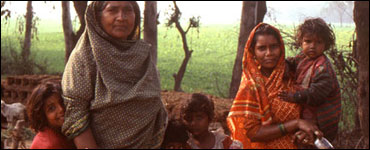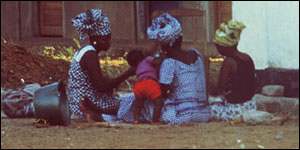CDC Features
Current Features
CDC Releases Toolkit to Assist Humanitarian Workers in Assessing Reproductive Health Needs of Women Refugees

Women refugees fleeing their homes are often vulnerable to critical health issues, including reproductive health concerns. After providing shelter and food, organizations are challenged to provide women in conflict settings with reproductive health services, such as ensuring safe pregnancies and deliveries and responding to and preventing physical abuse.
The Reproductive Health Assessment Toolkit for Conflict-Affected Women was developed by CDC in response to requests for technical assistance to assess reproductive health needs in conflict settings. Using the Toolkit, workers collect information about
• safe motherhood
• family planning
• sexual history
• sexually transmitted infections
• HIV/AIDS
• gender-based violence
• female genital cutting
• emotional health

With this information, organizations including government, non-government, and United Nations agencies that provide or are interested in providing reproductive health services to refugees can determine how to improve the reproductive health of refugee women and their families.
The data collection and assessment tool was tested in 3 locations. Workers in one location collected data that showed there was a low level of knowledge about methods to prevent sexually transmitted infections (STIs) and HIV/AIDS yet there was a high prevalence of risky behaviors and disease. The assessment indicated a need to reinforce services that improve knowledge on STIs and HIV/AIDS.
Assessing reproductive health needs requires gathering information and technical knowledge of how to conduct a survey. The Reproductive Health Assessment Toolkit for Conflict-Affected Women contains step-by-step instructions on implementing information gathering and assessment. The toolkit includes
• sampling instructions
• survey team training manual
• questionnaire
• public domain data entry program
• pre-programmed analysis plan
• suggestions for data use
Field staff and independent researchers who use the toolkit should be familiar with survey work, although the toolkit is designed to be used by staff with limited survey expertise. CDC provides training on use of the toolkit, so field staff can collect data that can inform program planning, monitoring, evaluation, and advocacy.
The toolkit was developed with funding from the Andrew Mellon Foundation through the CDC Foundation and the US Agency for International Development (USAID).
Additional Information
Page last updated: May 28, 2007
Content source: Division of Reproductive Health, National Center for Chronic Disease Prevention and Health Promotion
Content owner: National Center for Health Marketing
URL for this page: www.cdc.gov/Features/ReproductiveToolkit

